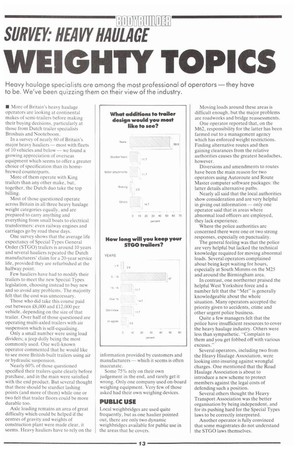WEIGHTY TOPICS
Page 129

If you've noticed an error in this article please click here to report it so we can fix it.
Heavy haulage specialists are among the most professional of operators — they have to be. We've been quizzing them on their view of the industry.
• More of Britain's heavy haulage operators are looking at continental makes of semi-trailers before making their buying decisions, particularly at those from Dutch trailer specialists Broshuis and Nooteboom.
In a survey of nearly 60 of Britain's major heavy hauliers — most with fleets of 10 vehicles and below — we found a growing appreciation of overseas equipment which seems to offer a greater choice of specification than its homebrewed counterparts.
More of them operate with King trailers than any other make, but, together, the Dutch duo take the top billing.
Most of those questioned operate across Britain in all three heavy haulage weight categories equally, and are prepared to carry anything and everything from small boats to electrical transformers: even railway engines and carriages go by road these days.
One survey shows that the average life expectancy of Special Types General Order (STGO) trailers is around 10 years and several hauliers repeated the Dutch manufacturers' claim for a 20-year service life, provided they are refurbished at the halfway point.
Few hauliers have had to modify their trailers to meet the new Special Types legislation, choosing instead to buy new and so avoid any problems. The majority felt that the cost was unnecessary.
Those who did take this course paid out between £8,000 and £12,000 per vehicle, depending on the size of that trailer. Over half of those questioned are operating multi-ax led trailers with air suspension which is self-equalising.
Only a small number were using load dividers; a jeep dolly being the most commonly used. One well-known operator commented that he would like to see more British-built trailers using air or hydraulic suspension.
Nearly 60% of those questioned specified their trailers quite clearly before purchase, and in the main were satisfied with the end product. But several thought that there should be sturdier lashing points (and more of them) while one or two felt that trailer floors could be more durable too.
Axle loading remains an area of great difficulty which could be helped if the centres of gravity and weights of construction plant were made clear, it seems. Heavy hauliers have to rely on the information provided by customers and manufacturers — which it seems is often inaccurate.
Some 75% rely on their own judgement in the end, and rarely get it wrong. Only one company used on-board weighing equipment. Very few of those asked had their own weighing devices.
PUBLIC USE
Local weighbridges are used quite frequently, but as one haulier pointed Out, there are only two dynamic weighbridges available for public use in the areas that he covers. Moving loads around these areas is difficult enough, but the major problems are roadworks and bridge reassessments.
One operator reported that, on the M62, responsibility for the latter has been farmed out to a management agency which has enforced weight restrictions. Finding alternative routes and then gaining clearances from the relative authorities causes the greatest headaches, however.
Diversions and amendments to routes have been the main reason for two operators using Autoroute and Route Master computer software packages: the latter details alternative paths.
Nearly all said that the local authorities show consideration and are very helpful in giving out information — only one operator said that in areas where abnormal load officers are employed, they lack experience.
Where the police authorities are concerned there were one or two strong responses, especially on punctuality.
The general feeling was that the police are very helpful but lacked the technical knowledge required for moving abnormal loads. Several operators complained about being kept waiting for hours, especially at South Mimms on the M25 and around the Birmingham area.
In contrast, one northerner praised the helpful West Yorkshire force and a number felt that the "Met" is generally knowledgeable about the whole situation. Many operators accepted the priority given to accidents, crime and other urgent police business.
Quite a few managers felt that the police have insufficient resources to cover the heavy haulage industry. Others were less than sympathetic. -Complain to them and you get fobbed off with various excuses."
Several operators, including two from the Heavy Haulage Association, were looking into insuring against wrongful charges. One mentioned that the Road Haulage Association is about to introduce a new scheme to protect members against the legal costs of defending such a position.
Several others thought the Heavy Transport Association was the better organisation by being independent, and for its pushing hard for the Special Types laws to be correctly interpreted.
Another operator is fully convinced that some magistrates do not understand the STGO laws themselves.




































































































































































